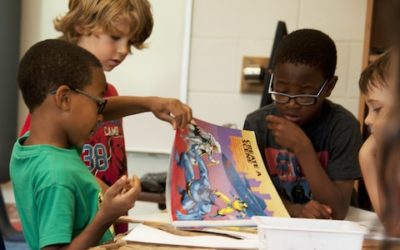“His mother had read everything to him and in medical school his wife was reading aloud all books and references…there was some opposition to his continuance in medical school on the part of the dean and one other faculty member, but the opposition subsided… After his graduation a report came from a distant medical school hospital stating that this man was the best intern they had had for some time. He passed his American boards in internal medicine and became the head of a group practice clinic in a large city…” — Lloyd Thompson, Reading Disability Should you help with homework? The answer is YES. There is a qualifier on that – you should help but only to the point that you’re helping your student […]
Chat with College Coach Kara Matejka
"It is incredibly common for students to get to college and just question everything. That's when all the wheels fall off...What am I even doing here? " — Kara Matejka, College Coach When all the excitement of arriving at college for the first time, getting to...
My Child Won’t Go to School: What to Do About School Avoidance
By Dr. Dan Peters of Summit Center "Things were fine last year and now he wakes up with a stomachache and says he doesn’t want to go to school. It takes me forever to get him out the door. We are often late. He ends up screaming at me and telling me I am the...
Super Teen Sophia Transforms Dyslexia Awareness in Oregon
"Just knowing the reason why you're having these issues makes a difference psychologically...that alone was kind of refreshing..." — Sophia, 16 Energized by her own recent identification of dyslexia, homeschooled teen Sophia decided to spread positive awareness of...
Building on Strengths in Math
Up to 70% of dyslexic people also have dyscalculia (specific math disability), although specific math supports or interventions are rarely a part of public school IEPs or 504's. Part of the reason there is less support for math among dyslexic students in the US is...
Helping Your Student with Intensity [Premium]
“Challenging behavior is just a signal, the fever, the means by which the kid is communicating that he or she is having difficulty meeting an expectation. “ — Ross Greene, The Explosive Child The difference between the experience of one student and his or her dyslexia can vary a great deal depending on temperament. In psychology, temperament refers to consistent differences in emotional disposition and behavior that are biologically-based and relatively consistent over time. Temperament is part of a person’s personality, which also includes intelligence, humor, interests, and talents. Among the various temperamental differences, certain “difficult temperamental traits” may make some school experiences (like remediation or pull-out) difficult to accept. Examples of difficult temperamental traits include: negative responses to new people or situations, slowness to […]
AI Voices Make Listening Easy
With AI, artificial voices for book reading are getting better. People who struggled with electronic voices in the past, may find themselves pleasantly surprised as AI-voices develop more natural voice pauses and even emotional tones that make listening more...
Redefining Dyslexia [Premium]
In the past year, there have been some remarkable papers published in the field of dyslexia. By and large, the changes seem to be good news and more inclusive of the diverse ways that dyslexia presents – including gifted individuals with dyslexia. But change is likely to be messy – and schools and educational and research groups are likely to different and present different information to students and their families. THE PENDULUM SWINGS AGAIN ON DISCREPANCY Although the earliest professional accounts about dyslexia recognized the unexpected connection of high intelligence with difficulties in reading, writing, and spelling, the dyslexia field has been involved in many warring opinions about whether cognitive tests are worthwhile. Without pointing fingers, many researchers and educational leaders over the years questioned […]
Now What? Beyond the Simple Dyslexia Screening
What About Audiobooks? Interview with Dyslexia Kit’s Yvonna Graham
"Audio books, turned out to be the most powerful tool I had in my toolkit." - Yvonna Graham, MEd., author Dyslexia Toolkit Despite the widespread availability of text-to-speech and audiobooks, it's only a small percentage of people who discover and use these tools....
AI for College Admissions [Premium]
With more colleges and universities waiving standardized tests for admissions, many college advisors are recognizing the importance of college application essays in the process. Rightly or wrongly, AI is also having considerable impact on college applications. For students who struggle with writing and writing about themselves, having a way to start the essay can greatly ease the stress on the application process. It is possible to use ChatGPT to help you build a professional sounding resume, but also use it to personalize an essay, tailor it to particular schools, and give different versions that help students choose the best fit to what they want to say. In one video, a tutor explains how she would chat to ChatGPT to generate different possible answers […]
Dyslexia: The Changing Landscape of College Entrance Exams
FEWER COLLEGES REQUIRING STANDARDIZED TESTS If you or your students struggled with standardized tests, there is good news on college admissions as increasing numbers of schools no longer require tests for admission. This fall, over 80% of four-year colleges...

![Should I Help with Homework? [Premium]](https://www.dyslexicadvantage.org/wp-content/uploads/2023/12/Should-I-help-with-homework-da-400x250.jpg)




![Helping Your Student with Intensity [Premium]](https://www.dyslexicadvantage.org/wp-content/uploads/2023/11/Helping-Your-Student-with-Intensity-Premium-1-400x250.jpg)

![Redefining Dyslexia [Premium]](https://www.dyslexicadvantage.org/wp-content/uploads/2023/11/Redefining-Dyslexia-Premium-e1699767152962-400x250.jpg)


![AI for College Admissions [Premium]](https://www.dyslexicadvantage.org/wp-content/uploads/2023/08/AI-for-College-Admissions-Premium-400x250.png)














